More than $700,000 was raised at the Goh Chok Tong Enable Fund (GCTEF) Harmony Gala on March 1 at Grand Hyatt, Singapore!
A single mum, Sandy Tan has been looking after her 20-year-old son Jayden Ong, who was diagnosed with autism when he was about four years old. A few years ago, it all became overwhelming, and she decided to take a step back.
“I felt that I needed to do something for myself,” says Sandy. That led her to pursue her love for sewing and turned this into an income-generating activity. With newfound confidence, Sandy started to encourage her son’s passion for art. This led to Jayden attending a creative art programme, and after fully utilising a training grant, he tapped on the Goh Chok Tong Enable Fund to continue with the programme.
A recent project featuring his art piece of a massive lantern went on display at Gardens by the Bay.

“As caregivers, we will get older. I am not sure if he could work part-time in the future,” says Sandy. Jayden had completed his training in hospitality housekeeping but found himself not ready for full-time work. She had also enrolled her son in an institute for higher learning, but the learning environment was hard for Jayden to cope with, due to his anxiety issues.
With the help of the Goh Chok Tong Enable Fund, Sandy is proud and hopeful that this newfound talent could bring some positive change in their lives. “Jayden would like to earn some allowance for himself,” she says.
She was born deaf, lost half her sight to the eye disease Retinitis Pigmentosa, yet remains very optimistic. Anyone who feels put out by what life doles out needs a dose of Faith. The 47-year-old is a bundle of joy, especially now that she has an avenue to express her hopes – digital art.

Blurred images are part of her everyday life. Still, Faith is thankful that she hasn’t lost her eyesight completely, which doctors had said would happen 10 years ago, and is glad that she can distinguish colours and see shapes in bright light.
“I loved art since I was young,” says Faith, who decided to pursue her passion in earnest only in late 2023, after she left her job at a cafe. “I realised then how much I love art. So, I explored what I could do, because just normal drawing with a pen or pencil isn’t possible. I cannot see,” she explains.
Signing up for a course in digital art opened a new world for Faith. “I realised that with digital art, I can see with my own eyes what I am drawing, so I decided to pursue the dream.”
Faith wasn’t always as sure of herself as she is now. “I completed school without obtaining O-level qualifications, and my hearing and visual impairments often left me unsure of my abilities and struggling with feelings of inferiority,” she recalls. “I was often worrying and feeling insecure about my future.”
Today, Faith spends most of her time refining her talent at home, which is a rental flat she shares with her mother. Through her social worker, Faith tapped on the Goh Chok Tong Enable Fund to buy a tablet and stylus that allow her to spend more time refining her digital art skills. She can now spend as much time as possible sketching on the bright iPad screen, shading colours using codes. It usually takes her a few days to create each of her artworks, which are mainly nature-themed.
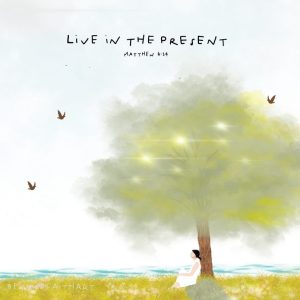
Faith’s latest artwork is titled “Live in the Present”. She says the piece is a visual representation of her life journey and hopes that her personal expression through art can serve as an encouragement to others facing challenges, while inspiring hope and resilience.
“The Goh Chok Tong Enable Fund has truly made a significant difference in my life, and for that, I am forever grateful,” she says.
“The Fund has not only eased my financial burden, but it also inspired a newfound sense of purpose and hope within me. With the aid of this gift, I am eager to embark on a new chapter in my life.”
On 8 September 2024, 220 golfers, donors and supporters came together at the Garden Course at Tanah Merah Country Club for a fantastic day of fundraising in support of Goh Chok Tong Enable Fund (GCTEF), a fund dedicated to empowering persons with disabilities. The Goh Chok Tong Enable Fund Charity Golf & Dinner 2024, supported by SG Enable and Mediacorp, raised $1million, and were honoured to have Emeritus Senior Minister Goh Chok Tong, Patron of GCTEF, as our Guest-of-Honour.
The event was packed with special moments such as inspirational performances by persons with disabilities, a live auction and special appearances by Mediacorp artistes Pan Ling Ling, Fang Rong, and Tay Ying to rally support for the fund. The organising committee headed by Mr Heng Chiang Meng include members Mr Alex Eow, Mr Fui Howe, Mr Tom Phua, and Dr Tan Kok Kheng worked hard to ensure the event was a resounding success.
The GCTEF empowers persons with disabilities to contribute to society and lead integrated lives through 3As: Financial Aid, supporting Aspirations, and conferring Awards to recognise their achievements and potential. SG Enable, the focal agency and first stop for disability and inclusion, empowers persons with disabilities through the GCTEF fund, which enables them to be active members of society and lead integrated lives.
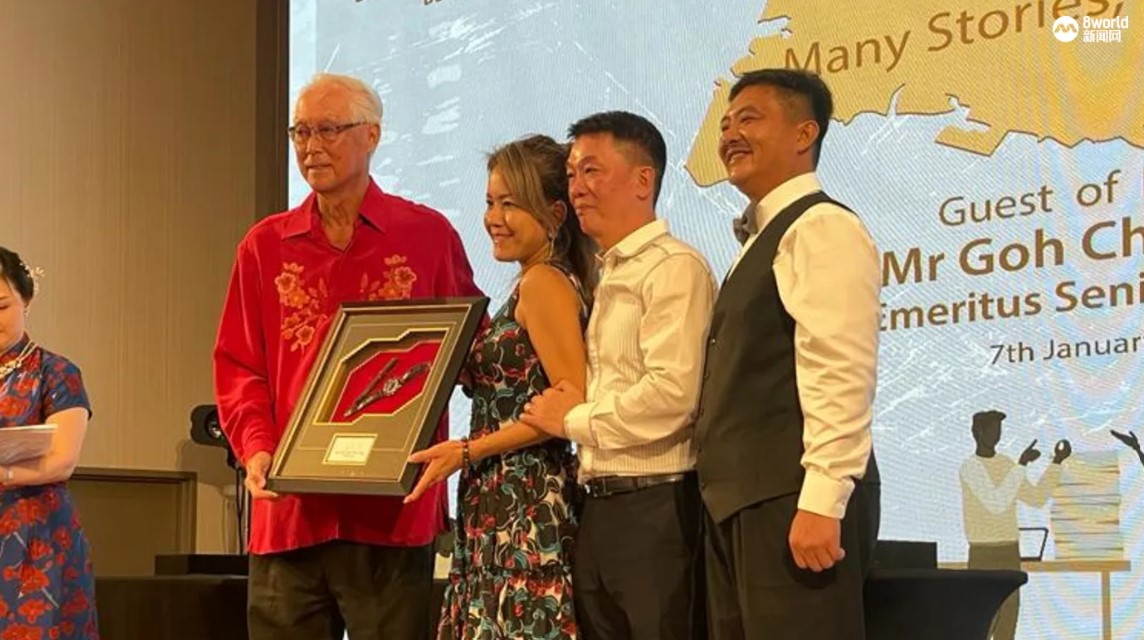
吴作栋捐出自己的手表和钢笔供竞标,两样物品最终以26万元的高价拍出,得标的是Epl Alliance Pte Ltd公司。(图:叶衍娴)
庆祝生日不忘做慈善!潮安会馆候任主席张学彬昨天(7日)庆祝46岁生日,特地举办一场盛大生日晚宴,为吴作栋协立慈善基金筹款,并邀得荣誉国务资政吴作栋担任主宾,整个晚宴总共为协立慈善基金筹得近250万元善款。
其中,吴作栋也捐出自己的手表和钢笔供竞标,两样物品最终以26万元的高价拍出,得标的是Epl Alliance Pte Ltd公司。
而印有吴作栋、社会及家庭发展部高级政务次长蔡瑞隆、国会议员陈佩玲、林谋泉和阀贺米的掌印纪念品,则拍得33万3333元3角3分的高价,由商人朱志强夫妇标得。
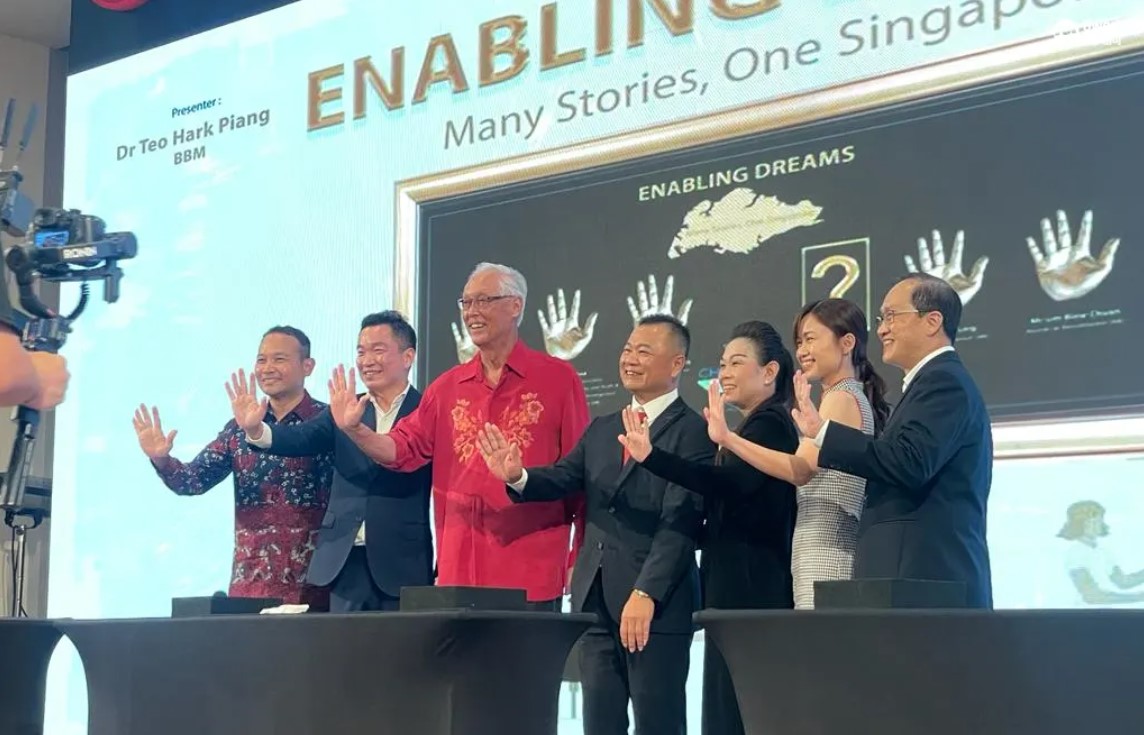
商人朱志强夫妇以33万3333元3角3分的高价标得掌印纪念品。(图:叶衍娴)
46岁的张学彬,是优联燃气控股的总裁,活跃于多个会馆社团。配合他的生日,他昨晚在醉花林俱乐部礼堂举办这场名为“实现梦想”(Enabling Dreams)的慈善晚宴。出席者除上述多个政要议员外、还包括企业家、商界领袖等“重量级”人物。
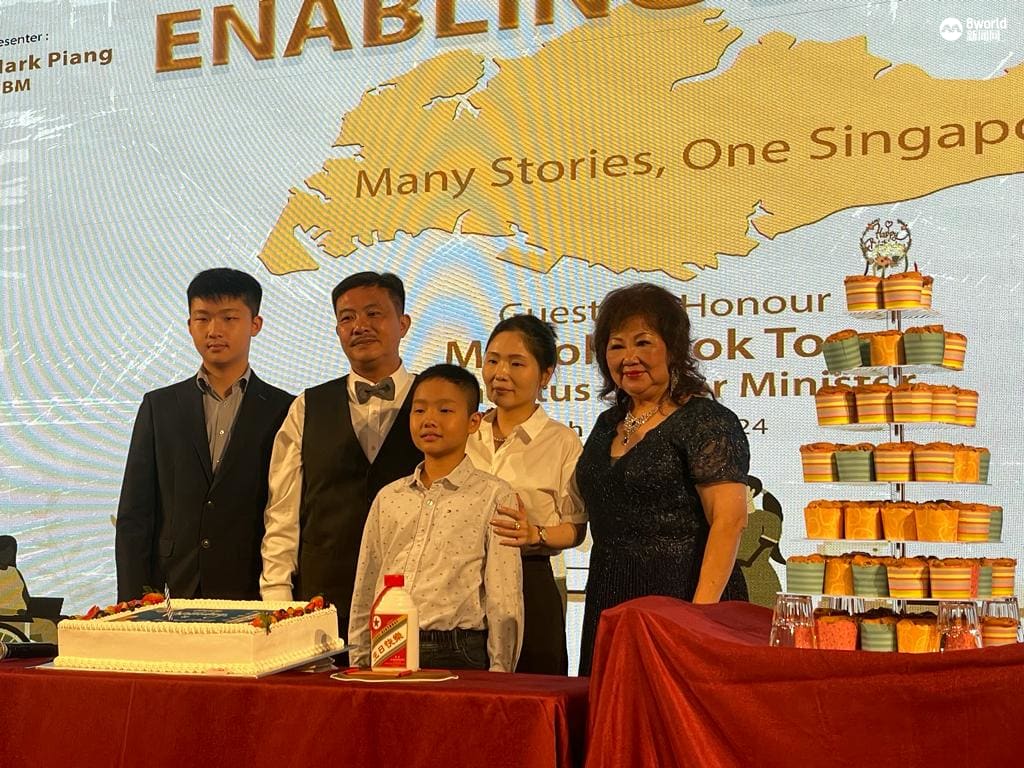
张学彬一家上台为他庆祝生日(图:叶衍娴)
张学彬接受《8视界新闻网》访问时说,昨晚的晚宴对他来说,意义非凡。他说,其实庆生是次要,更重要的是想要做一场慈善筹款活动。
“我觉得,社会上还有一些不幸群体,需要我们去帮助。生日年年有,但不是说,年年都可以去办慈善活动。很幸运的,大家都很疼爱我,一叫就来了。”
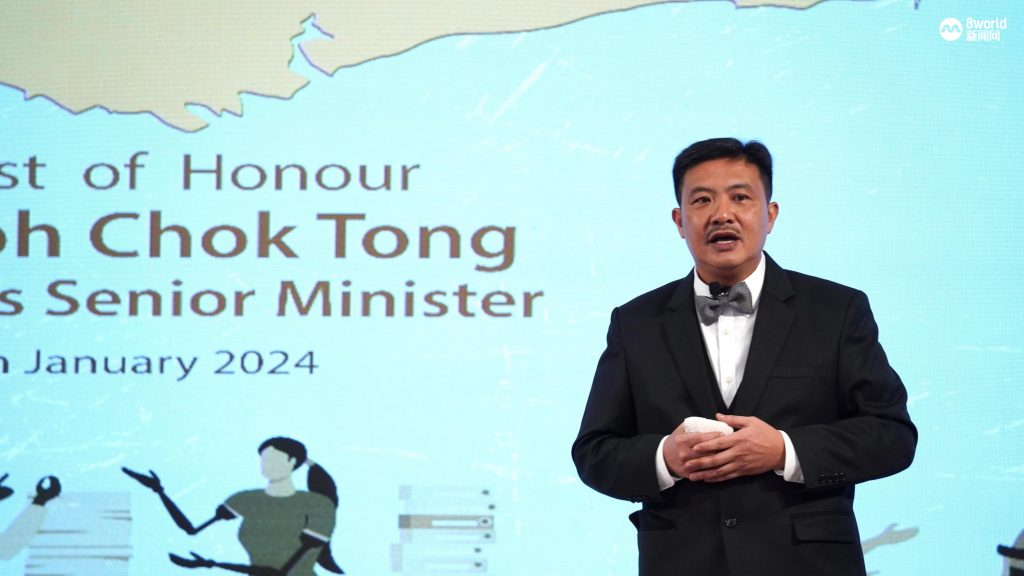
张学彬。(图:何婷婷)
张学彬说,昨晚筹到的所有善款,都将捐给吴作栋协立慈善基金,希望尽可能帮助到更多的有需要群体。
吴作栋在致辞时说,吴作栋协立慈善基金至今已发放超过500万元协助残障人士,他希望该基金是可持续性的,以便能继续为残障人士得生活带来积极得影响。
昨晚的庆生慈善活动,共进行长达四个小时,分别举行多场的慈善义标项目,在场的仁人善翁、商界人士都非常踊跃参与捐款,整个慈善晚宴最终共筹得243万8888元。
吴作栋协立慈善基金受惠者,昨晚在晚宴上也带来多项余兴节目,使得晚宴热闹精彩。
吴作栋协立慈善基金旨在为残障人士提供对社会做出贡献和融入社会的机会。基金由新协立管理,新传媒鼎力支持。荣誉国务资政吴作栋是基金的赞助人。欲通过吴作栋协立慈善基金给予残障人士支持, 请浏览 GCTEnableFund.sg。
文: 8 world 叶衍娴
987 DJ Sonia Chew spent a day getting to know Joan Hung, a Goh Chok Tong Enable Awards 2021 Promise Awardee.
Joan was born with visual impairment, but that has not stopped her from pursuing her passion for sports. She has represented Singapore in Goalball in the ASEAN Para Games in 2015 and 2022, and has even picked up Judo. Joan continues to advocate for inclusivity by giving educational talks on resilience through sports to students in schools.
You too can make a difference and support persons with disabilities like Navin by giving to the Goh Chok Tong Enable Fund at giving.sg/GCTEnableFund.
Formerly the Mediacorp Enable Fund, the Goh Chok Tong Enable Fund was renamed after its Patron, Emeritus Senior Minister Goh Chok Tong, to better reflect its roots and intent in aiding persons with disabilities to actively contribute to society and lead socially integrated lives. The Fund is administered by SG Enable, and supported by Mediacorp.
#GCTEnableFund #GohChokTongEnableFund
WARNA 942 DJ A B Shaik spent a day getting acquainted with Amirul Afiq, a beneficiary of the Goh Chok Tong Enable Fund.
Amirul was born deaf, but he has never allowed his disability to deter him from living life to the fullest. The Fund aided Amirul in purchasing a cochlear implant, which allowed him to fulfil his childhood dream of learning to drive.
You too can make a difference and support persons with disabilities like Navin by giving to the Goh Chok Tong Enable Fund at giving.sg/GCTEnableFund.
Formerly the Mediacorp Enable Fund, the Goh Chok Tong Enable Fund was renamed after its Patron, Emeritus Senior Minister Goh Chok Tong, to better reflect its roots and intent in aiding persons with disabilities to actively contribute to society and lead socially integrated lives. The Fund is administered by SG Enable, and supported by Mediacorp.
#GCTEnableFund #GohChokTongEnableFund
Richie Koh and Goh Chok Tong Enable Fund beneficiary Fengze spent the day together and bonded over their love for all things superheroes.
Diagnosed with autism and Pierre Robin Syndrome, which causes breathing difficulties, Fengze is unable to communicate verbally and requires constant care and supervision from his parents to ensure his safety.
You too can make a difference and support persons with disabilities like Navin by giving to the Goh Chok Tong Enable Fund at giving.sg/GCTEnableFund.
Formerly the Mediacorp Enable Fund, the Goh Chok Tong Enable Fund was renamed after its Patron, Emeritus Senior Minister Goh Chok Tong, to better reflect its roots and intent in aiding persons with disabilities to actively contribute to society and lead socially integrated lives. The Fund is administered by SG Enable, and supported by Mediacorp.
#GCTEnableFund #GohChokTongEnableFund
Oli 968 artiste Anand K spent a day with Dr Navin Nair, Goh Chok Tong Enable Awards 2022 Promise Awardee, who was diagnosed with cerebral palsy at birth.
He became a force for good, working with the Land Transport Authority and SMRT in their efforts to support persons with disabilities in navigating the public transport system.
You too can make a difference and support persons with disabilities like Navin by giving to the Goh Chok Tong Enable Fund at giving.sg/GCTEnableFund.
Formerly the Mediacorp Enable Fund, the Goh Chok Tong Enable Fund was renamed after its Patron, Emeritus Senior Minister Goh Chok Tong, to better reflect its roots and intent in aiding persons with disabilities to actively contribute to society and lead socially integrated lives. The Fund is administered by SG Enable, and supported by Mediacorp.
#GCTEnableFund #GohChokTongEnableFund
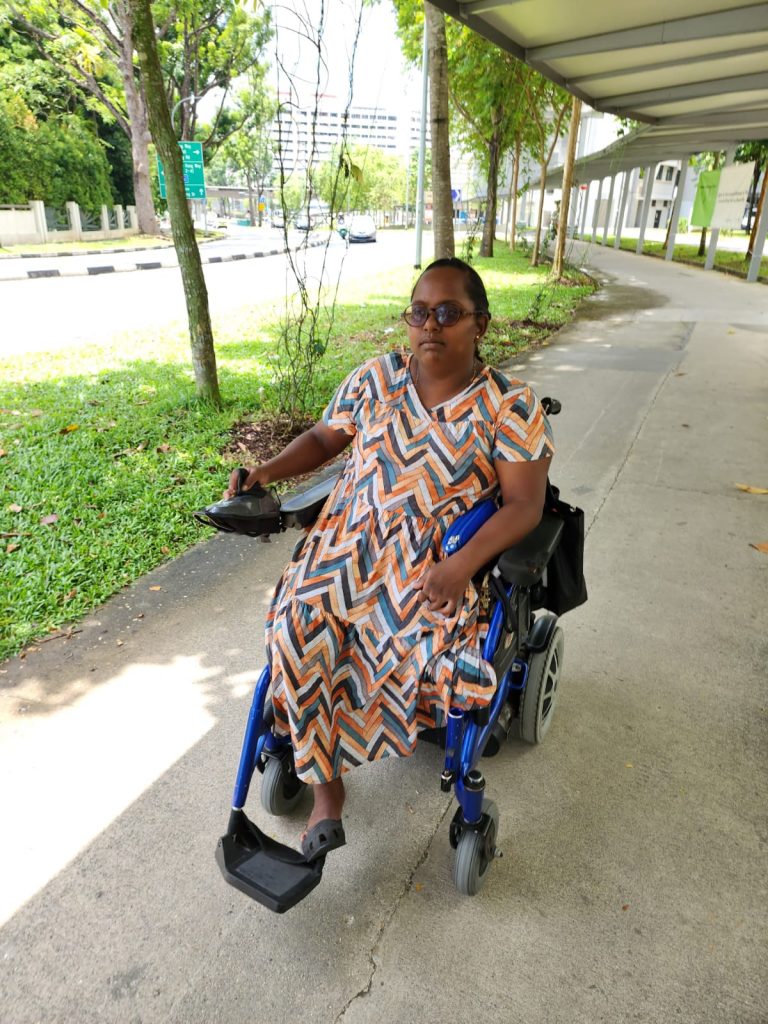
Mary Sagaya travelling on her motorised wheelchair, which she purchased with aid from the Goh Chok Tong Enable Fund (GCTEF)
Weekends are always busy for 41-year-old Executive Assistant, Mary Sagaya; like most, she spends quality time with her family either visiting various parks or going shopping. It has been six years since Mary purchased her motorised wheelchair with aid from the Goh Chok Tong Enable Fund (GCTEF), which Mary shared, has allowed her to once again travel independently.
A life full of challenges
At birth, Mary was diagnosed with Congenital Band Syndrome, a condition where tissue bands form around fingers or limbs, affecting the blood flow and growth of the joints. For Mary specifically, the syndrome caused deformation in her fingers and legs.
As a student, Mary attended a mainstream school but recalled the tough journey she underwent. “They (the other students) would tease me, call me alien and all sorts of other names,” Mary shared with a wry laugh.
However, that was the least of Mary’s concerns. Up till the age of 18, Mary had to undergo multiple operations to straighten her bent legs. Unfortunately, a nerve was severed from Mary’s last surgery, which cost her the ability to walk. Despite the setback, Mary and her family took this in their stride. Mary explained, “All my life I was constantly in pain but now, because I lost all sensation in my legs, there was no more pain.”
But that was not the last hurdle Mary had to overcome. Due to the loss of feeling in her legs, Mary was unaware when she had badly gashed the sole of her left foot on a piece of glass. The severe injury led to gangrene, leaving doctors with no choice but to amputate her left leg below the knee. Following the amputation in 2001, Mary tried adapting to life with a prosthetic leg but further complications resulted in Mary having to undergo another procedure to further amputate her left leg, this time above her knee.
The tough gets going
In the early days of adjusting to her decreased mobility, Mary refused to rely on a wheelchair to get around. She tried giving crutches a go, but found that it was too physically demanding. She became reluctant to go out despite constant encouragement from her mother.
Now, after six years of using a motorised wheelchair, Mary chuckles at her initial reluctance. “I have freedom!” Mary exclaims ecstatically while explaining her commutes on the public transport system including buses and MRT trains.
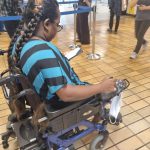
Mary commuting on the public transport system
Today, Mary commutes daily from her home in Bukit Panjang to her parent’s place in Choa Chu Kang to care for her ailing mother. Seasoned with the use of her motorised wheelchair, Mary accompanies her mother and sister for medical appointments and sends her nephew and nieces for their tuition classes.
A new-found confidence
Mary attributes her new-found confidence to her supportive workplace, Chapman Consulting Group Pte Ltd, and encouraging colleagues who are fellow wheelchair users. Mary is also grateful to the Handicaps Welfare Association for directing her to the GCTEF, which promptly assisted Mary in purchasing her motorised wheelchair. “I have to use the H word, handicapped. Really! Without it, my daily living activities would be limited.”

With her motorised wheelchair, Mary is once again able to travel confidently on her own
Taking all the obstacles she has faced in her stride, Mary is now a highly positive and confident individual.
Mary is one of over 1,000 persons with disabilities who have had their aspirations and needs met through the GCTEF. Since its inception in 2016, the GCTEF has improved the employability of another 1,000 and reached over 40,000 Singaporeans in promoting social inclusivity.
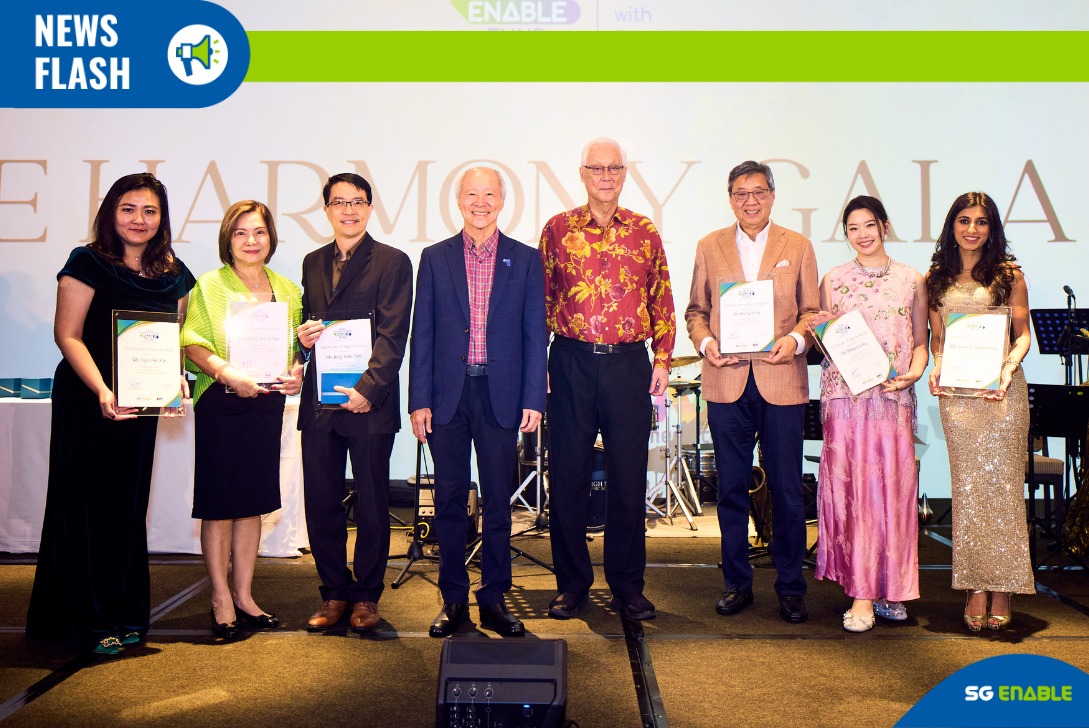
More than $700,000 was raised at the Goh Chok Tong Enable Fund (GCTEF) Harmony Gala on March 1 at Grand Hyatt, Singapore! Led by GCTEF Fundraising Chairman, Mr Richard Eu, the gala, emceed by Mediacorp’s 987FM DJ Germaine Tan, was filled with unforgettable moments. It included an inspirational performance by a GCTEF beneficiary Nur […]
Read More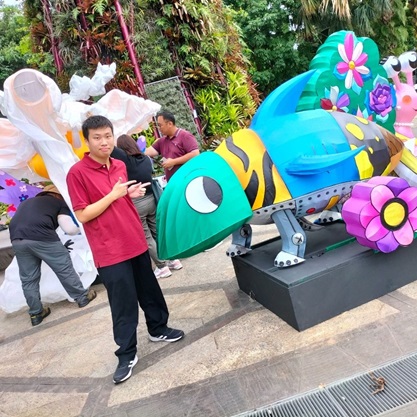
A single mum, Sandy Tan has been looking after her 20-year-old son Jayden Ong, who was diagnosed with autism when he was about four years old. A few years ago, it all became overwhelming, and she decided to take a step back. “I felt that I needed to do something for myself,” says Sandy. That […]
Read More
She was born deaf, lost half her sight to the eye disease Retinitis Pigmentosa, yet remains very optimistic. Anyone who feels put out by what life doles out needs a dose of Faith. The 47-year-old is a bundle of joy, especially now that she has an avenue to express her hopes – digital art. Blurred […]
Read More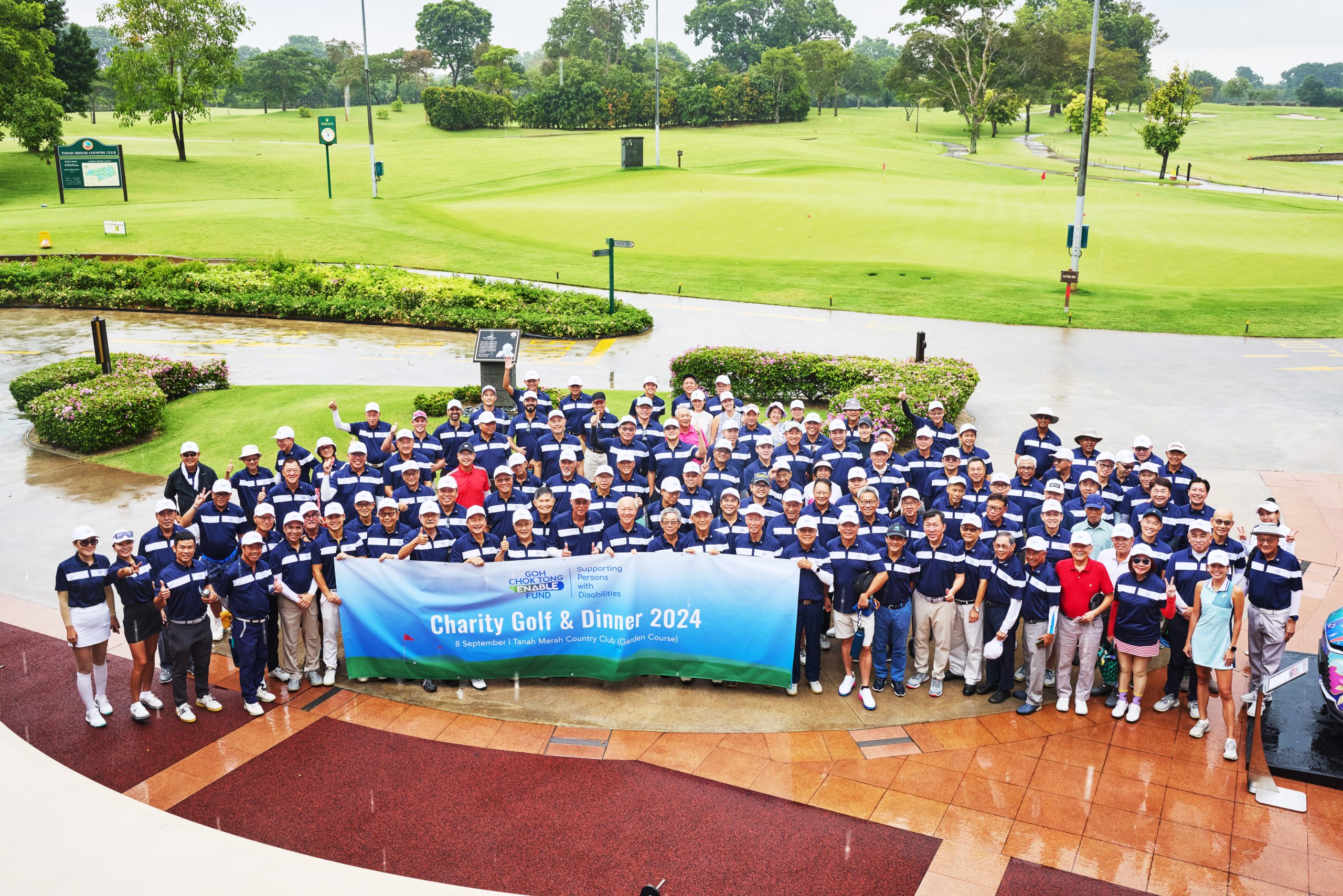
On 8 September 2024, 220 golfers, donors and supporters came together at the Garden Course at Tanah Merah Country Club for a fantastic day of fundraising in support of Goh Chok Tong Enable Fund (GCTEF), a fund dedicated to empowering persons with disabilities. The Goh Chok Tong Enable Fund Charity Golf & Dinner 2024, supported […]
Read More
庆祝生日不忘做慈善!潮安会馆候任主席张学彬昨天(7日)庆祝46岁生日,特地举办一场盛大生日晚宴,为吴作栋协立慈善基金筹款,并邀得荣誉国务资政吴作栋担任主宾,整个晚宴总共为协立慈善基金筹得近250万元善款。 其中,吴作栋也捐出自己的手表和钢笔供竞标,两样物品最终以26万元的高价拍出,得标的是Epl Alliance Pte Ltd公司。 而印有吴作栋、社会及家庭发展部高级政务次长蔡瑞隆、国会议员陈佩玲、林谋泉和阀贺米的掌印纪念品,则拍得33万3333元3角3分的高价,由商人朱志强夫妇标得。 46岁的张学彬,是优联燃气控股的总裁,活跃于多个会馆社团。配合他的生日,他昨晚在醉花林俱乐部礼堂举办这场名为“实现梦想”(Enabling Dreams)的慈善晚宴。出席者除上述多个政要议员外、还包括企业家、商界领袖等“重量级”人物。 协立慈善基金至今发放逾500万元助残障人士 张学彬接受《8视界新闻网》访问时说,昨晚的晚宴对他来说,意义非凡。他说,其实庆生是次要,更重要的是想要做一场慈善筹款活动。 “我觉得,社会上还有一些不幸群体,需要我们去帮助。生日年年有,但不是说,年年都可以去办慈善活动。很幸运的,大家都很疼爱我,一叫就来了。” 张学彬说,昨晚筹到的所有善款,都将捐给吴作栋协立慈善基金,希望尽可能帮助到更多的有需要群体。 吴作栋在致辞时说,吴作栋协立慈善基金至今已发放超过500万元协助残障人士,他希望该基金是可持续性的,以便能继续为残障人士得生活带来积极得影响。 昨晚的庆生慈善活动,共进行长达四个小时,分别举行多场的慈善义标项目,在场的仁人善翁、商界人士都非常踊跃参与捐款,整个慈善晚宴最终共筹得243万8888元。 吴作栋协立慈善基金受惠者,昨晚在晚宴上也带来多项余兴节目,使得晚宴热闹精彩。 吴作栋协立慈善基金旨在为残障人士提供对社会做出贡献和融入社会的机会。基金由新协立管理,新传媒鼎力支持。荣誉国务资政吴作栋是基金的赞助人。欲通过吴作栋协立慈善基金给予残障人士支持, 请浏览 GCTEnableFund.sg。 文: 8 world 叶衍娴
Read More
987 DJ Sonia Chew spent a day getting to know Joan Hung, a Goh Chok Tong Enable Awards 2021 Promise Awardee. Joan was born with visual impairment, but that has not stopped her from pursuing her passion for sports. She has represented Singapore in Goalball in the ASEAN Para Games in 2015 and 2022, […]
Read More